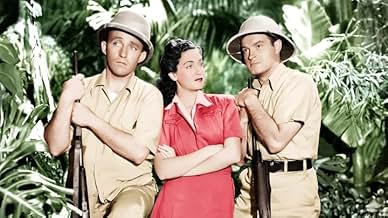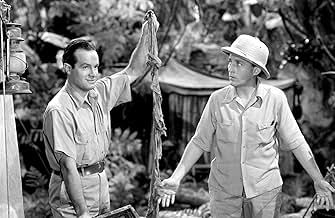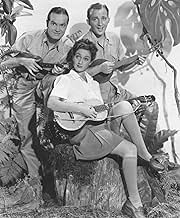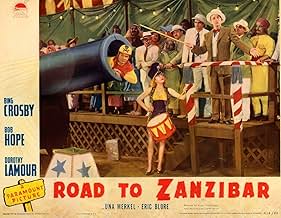IMDb RATING
6.7/10
3.4K
YOUR RATING
Stranded in Africa, Chuck and his pal Fearless have comic versions of jungle adventures, featuring two attractive con women.Stranded in Africa, Chuck and his pal Fearless have comic versions of jungle adventures, featuring two attractive con women.Stranded in Africa, Chuck and his pal Fearless have comic versions of jungle adventures, featuring two attractive con women.
- Awards
- 2 wins total
John Ralph Bilbo
- Solomon
- (uncredited)
Al Bridge
- Colonial Policeman with Inspector
- (uncredited)
Ken Carpenter
- Commentator
- (uncredited)
Storyline
Did you know
- GoofsWhen Lamour and Crosby are in the rowboat on the lake, harp music plays when they dangle their hands in the water. At the end of the song Crosby sings, the harp music begins before Lamour puts her hand in the water. You can see her surprised look when she realizes she is late.
- Quotes
Chuck Reardon: Everybody knows him. He's a philathropist.
Hubert 'Fearless' Frazier: I don't care who he votes for. I want my money.
- ConnectionsFeatured in The 69th Annual Academy Awards (1997)
- SoundtracksRoad to Zanzibar
(uncredited)
Music by Jimmy Van Heusen
Lyrics by Johnny Burke
[Sung by Bing Crosby and chorus while on safari]
Featured review
Of the comedy teams that made a series of movies in the 1940s and 1950s, Hope and Crosby were probably the most engagingly amusing.
Abbott and Costello were usually silly. Their movies seemed aimed at an audience of children, although some, like "Meet Frankenstein", are outrageous. There was an element of sadism too, with Abbott (always the humorless straight man) slapping the helpless Costello around and snarling at him, a standard relationship left over I guess from vaudeville where clowns batted each other over the head with bladders.
Martin and Lewis were clearly differentiated. Martin was the parent and Lewis was the twelve-year-old child. It all seems a bit much, now.
But Hope and Crosby were the most nearly equal. Crosby was the smooth-talking crooner. Both were cowards but Hope was a braggart too, a stock figure in the comedies of Ancient Rome and afterward. I think the figure was called miles gloriosus. What they had that the other teams didn't, and what's on good display here, is a kidding quality that consists of trying to outwit one another, competition for the girl (Dorothy Lamour), inside jokes, and a kind of comfortably relaxed unspoken friendship that draws the audience in.
In many ways the funniest scene is when Hope and Crosby realize they've been double crossed by Lamour and set out to find her and tell her off. They discover some shreds of her clothing and conclude, mistakenly, that she's been eaten by leopards and carried off. (Hope: "They didn't even leave an ear. What hogs those leopards are.") The two men try to mourn her passing in a sincere and dignified way but their anger at her keeps simmering to the surface. They interrupt their weeping to recite some poetry over her buried clothing but they don't know any poems. Hope starts off with, "A bunch of the boys were whooping it up/ in the Malamut saloon..." Crosby chides him and instead begins to recite "Casey at the Bat." The scene simply cracks me up. Crosby: "She was just a kid." Hope: "We'll miss her. Even though she was WRONG!" When they realize she's still alive they sneer and kick away the dirt from her "grave."
I don't think of "The Road to Zanzibar" as necessarily their best Road picture, although it's right up there with "Utopia" and "Morocco." It was basically their first though. The earlier "Road to Singapore" lacked the lazy improvisational impression that this one has. "Singapore" seems, in retrospect, too well plotted, if you can imagine. You've gotta give these guys a little room to kick out.
The plot's absurd anyway. Africa on the Paramount set, with phony drums and "natives" and a guy in a gorilla suit engaged in a professional wrestling match with Hope. Actually, Hope's pretty amusing. Woody Allen has said that he picked up quite a few of Hope's comic mannerisms to use in his own performances. (See also Hope's "They've Got Me Covered," a classic of its kind, so to speak.) And Crosby is a necessary counterpart to Hope's physicality. The two work very well together.
I'll have to throw in one of their exchanges. The pair find themselves broke and stranded in a small African town.
Hope (gloomily): "This must be the nowhere that people say they're 500 miles from."
Crosby: "Well don't blame me. We wouldn't be here if you hadn't sold the map to that diamond mine."
Hope: "Hah! It's your fault! If you hadn't bought it I wouldn't have had it. And if I didn't have it I couldn't sell it. So if I couldn't sell it, then we wouldn't be stuck here, would we?"
Crosby: "Nope."
Hope (looks doubtful for a moment, thinking hard): "I don't get it."
Their movies also produced a number of popular songs, some of which have become standards. This one has "It's Always You." Others have songs like "Moonlight Becomes You."
You'll probably enjoy this one. If you're in the proper mood, it will crack you up.
Abbott and Costello were usually silly. Their movies seemed aimed at an audience of children, although some, like "Meet Frankenstein", are outrageous. There was an element of sadism too, with Abbott (always the humorless straight man) slapping the helpless Costello around and snarling at him, a standard relationship left over I guess from vaudeville where clowns batted each other over the head with bladders.
Martin and Lewis were clearly differentiated. Martin was the parent and Lewis was the twelve-year-old child. It all seems a bit much, now.
But Hope and Crosby were the most nearly equal. Crosby was the smooth-talking crooner. Both were cowards but Hope was a braggart too, a stock figure in the comedies of Ancient Rome and afterward. I think the figure was called miles gloriosus. What they had that the other teams didn't, and what's on good display here, is a kidding quality that consists of trying to outwit one another, competition for the girl (Dorothy Lamour), inside jokes, and a kind of comfortably relaxed unspoken friendship that draws the audience in.
In many ways the funniest scene is when Hope and Crosby realize they've been double crossed by Lamour and set out to find her and tell her off. They discover some shreds of her clothing and conclude, mistakenly, that she's been eaten by leopards and carried off. (Hope: "They didn't even leave an ear. What hogs those leopards are.") The two men try to mourn her passing in a sincere and dignified way but their anger at her keeps simmering to the surface. They interrupt their weeping to recite some poetry over her buried clothing but they don't know any poems. Hope starts off with, "A bunch of the boys were whooping it up/ in the Malamut saloon..." Crosby chides him and instead begins to recite "Casey at the Bat." The scene simply cracks me up. Crosby: "She was just a kid." Hope: "We'll miss her. Even though she was WRONG!" When they realize she's still alive they sneer and kick away the dirt from her "grave."
I don't think of "The Road to Zanzibar" as necessarily their best Road picture, although it's right up there with "Utopia" and "Morocco." It was basically their first though. The earlier "Road to Singapore" lacked the lazy improvisational impression that this one has. "Singapore" seems, in retrospect, too well plotted, if you can imagine. You've gotta give these guys a little room to kick out.
The plot's absurd anyway. Africa on the Paramount set, with phony drums and "natives" and a guy in a gorilla suit engaged in a professional wrestling match with Hope. Actually, Hope's pretty amusing. Woody Allen has said that he picked up quite a few of Hope's comic mannerisms to use in his own performances. (See also Hope's "They've Got Me Covered," a classic of its kind, so to speak.) And Crosby is a necessary counterpart to Hope's physicality. The two work very well together.
I'll have to throw in one of their exchanges. The pair find themselves broke and stranded in a small African town.
Hope (gloomily): "This must be the nowhere that people say they're 500 miles from."
Crosby: "Well don't blame me. We wouldn't be here if you hadn't sold the map to that diamond mine."
Hope: "Hah! It's your fault! If you hadn't bought it I wouldn't have had it. And if I didn't have it I couldn't sell it. So if I couldn't sell it, then we wouldn't be stuck here, would we?"
Crosby: "Nope."
Hope (looks doubtful for a moment, thinking hard): "I don't get it."
Their movies also produced a number of popular songs, some of which have become standards. This one has "It's Always You." Others have songs like "Moonlight Becomes You."
You'll probably enjoy this one. If you're in the proper mood, it will crack you up.
- rmax304823
- Aug 2, 2004
- Permalink
- How long is Road to Zanzibar?Powered by Alexa
Details
- Runtime1 hour 31 minutes
- Color
- Aspect ratio
- 1.37 : 1
Contribute to this page
Suggest an edit or add missing content


































